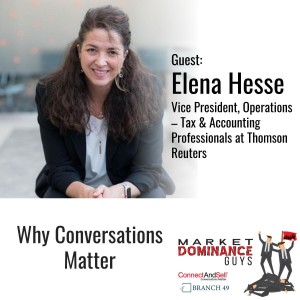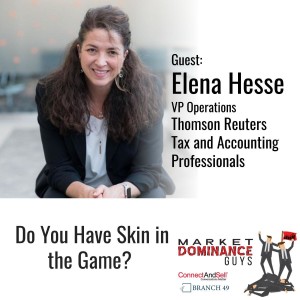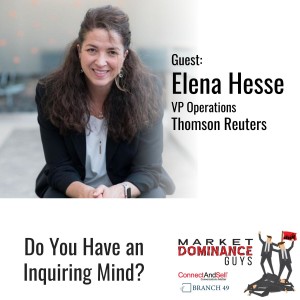Market Dominance Guys
Guest: Elena Hesse
Episodes

Tuesday May 10, 2022
EP131: Why Conversations Matter
Tuesday May 10, 2022
Tuesday May 10, 2022
“When you share your life nuggets, you don’t know when it’s going to matter to someone,” observes Elena Hesse, our Market Dominance Guys’ guest and the Vice President of Operations of Thomson Reuters’ tax and accounting professionals in this third of three podcast episodes with our hosts, Chris Beall and Corey Frank. For the past four years, Elena has led the “NoTimeToRead Book Club” for #GirlsClub, an organization dedicated to changing the face of sales leadership by empowering more women to earn roles in management. Corey starts off the conversation by asking Elena to describe what happens in a book club that doesn’t require reading the book. “A book is just a vehicle for a conversation. You never know when something is going to resonate,” she says, as she explains how the subject matter generates ideas and experiences that club members share with each other. And just like the book club participants, Corey, Chris, and Elena share ideas and personal insights of their own, which cover everything from the sales benefits of a live conversation over an emailed message to the trust-creating habit of asking for clarification when you don’t understand something. As Chris says, “The essence of curiosity is embracing our ignorance.” So, get ready to open your mind and heart to embrace what these three experienced salespeople share with each other — and with you — about the essence of this week’s Market Dominance Guys podcast, “Why Conversations Matter.”
About Our Guest
Elena T. Hesse, Vice President, Operations – Tax & Accounting Professionals at Thomson Reuters, has been with this firm for more than 30 years. Elena is also a thought leader for #GirlsClub, leading the book club discussions to support #GirlsClub and its continuing work of changing the face of sales leadership by empowering more women to earn roles in management.

Tuesday May 03, 2022
EP:130 Do You Have Skin in the Game?
Tuesday May 03, 2022
Tuesday May 03, 2022
“When you go to a doctor, do you want that doctor to be excellent — or okay?” Elena Hesse, our Market Dominance Guys’ guest and the Vice President of Operations of Thomson Reuters’ tax and accounting professionals, poses this question to our podcast hosts, Corey Frank and Chris Beall. Their answer — and yours too, no doubt — is that they want doctors who love their job and do it extremely well. Elena, Chris, and Corey talk about how this equates to the role of the salesperson. In the old days, sales was generally a “hit and run” affair. You’d probably never see your customers again once the sale was made, so there was little reason to provide true value in a product or to develop and maintain a relationship with a customer. But in the modern world, most of us want to sell our customers an upgrade or an add-on or a renewal. So, product value and excellent customer relations are essential. In other words, if you want to be successful in sales today, our three sales experts say that it’s crucial to have skin in the game. Oh, yeh. It’s self-examination time. Evaluate your personal investment in your job as you listen to today’s Market Dominance Guys’ episode. “Do You Have Skin in the Game?”
About Our Guest
Elena T. Hesse, Vice President, Operations – Tax & Accounting Professionals at Thomson Reuters, has been with this firm for more than 13 years. Elena is also a thought leader for #GirlsClub, leading the book club discussions to support #GirlsClub and its continuing work of changing the face of sales leadership by empowering more women to earn roles in management.

Wednesday Apr 27, 2022
EP129: Do You Have an Inquiring Mind?
Wednesday Apr 27, 2022
Wednesday Apr 27, 2022
“If you’re not curious, you’re not going to be a good sales rep.” That’s the well-considered opinion of our Market Dominance Guys’ guest, Elena Hesse, Vice President of Operations of Thomson Reuters’ tax and accounting professionals. As a naturally curious person herself, Elena has observed that “You can’t be speaking more than you’re listening” if you’re going to learn what you need to know about your prospects and their businesses. You have to ask those insight-seeking questions and then truly pay attention to their answers in order to discover whether your product or service is a good fit for their needs. Our two podcast hosts, Corey Frank and Chris Beall, totally agree with Elena that the best way to establish a good relationship with your sales prospect is with an inquiring mind — not a sales pitch. Curious about what else these three have to say? Listen to today’s Market Dominance Guys’ episode, “Do You Have an Inquiring Mind?”
About Our Guest
Elena T. Hesse, Vice President, Operations – Tax & Accounting Professionals at Thomson Reuters, has been with this firm for more than 13 years. Elena is also a thought leader for #GirlsClub, leading the book club discussions to support #GirlsClub and its continued work in changing the face of sales leadership by empowering more women to earn roles in management.